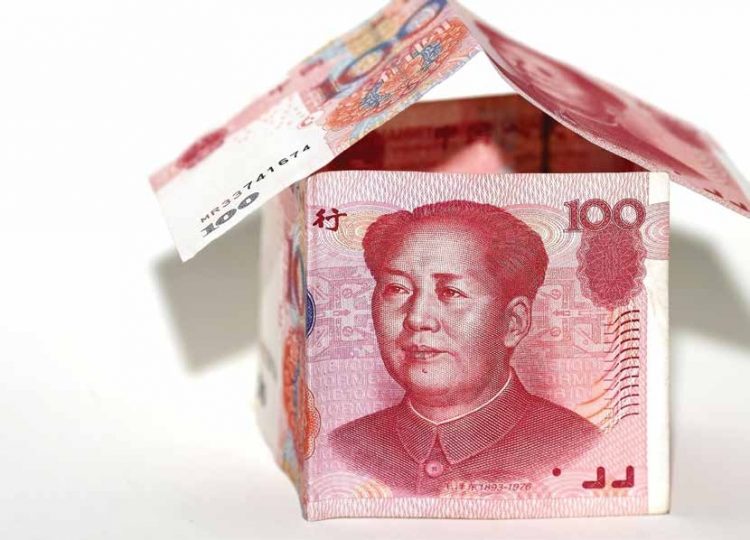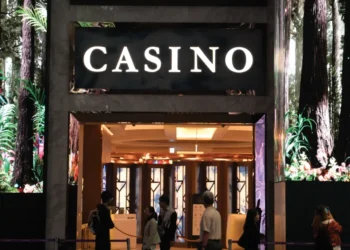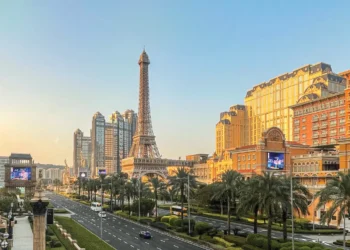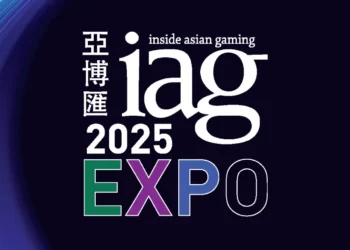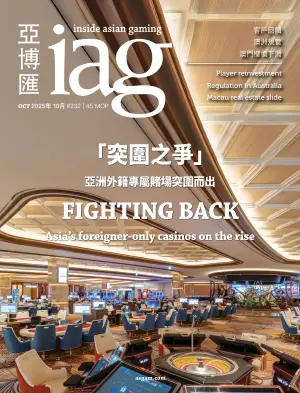Is casino ownership the next step in Macau junket promoters’ evolution?
By Muhammad Cohen, Editor At Large
Junket promoters say they’re bearing the brunt of Macau’s gaming slump. VIP revenue fell 11% last year and 41% through the first three quarters of this year, well ahead of Macau’s overall decline. Union Gaming Securities Asia estimates VIP play now constitutes less than half of Macau’s gross gaming revenue, factoring in mass tables moved to VIP to beat the smoking ban, down from 73% in 2011.
Many high rollers have stopped coming to Macau or substantially cut back on their play amid China’s anti-corruption crackdown and greater scrutiny of money transfers. Debt repayments to junkets have slowed and assets securing loans have lost value. The theft from junket room operator Dore Group in September, after last year’s US$1.3 billion heist by junket promoter Huang Shan, reminds investors that junkets pay interest rates as high as 2% a month precisely because providing capital to VIP rooms is risky. In the wake of the Dore scandal, Macau authorities are requiring more financial disclosures by junkets. To rub it all in, Melco Crown opened Studio City in October without VIP rooms, focused solely on higher margin mass market play.
Junket promoters have reduced their Macau operations over the past 18 months and some of the smaller ones have closed shop. Top five junket Neptune Group, in its annual report released in September, calls its liquidity position “extremely vulnerable” and they have contemplated pulling out of Macau. While some analysts forecast an imminent VIP rebound, Union Gaming’s Grant Govertsen expects more junket closures, possibly including “one of the major players … carried out on a stretcher.”
Some junkets have a Plan B – buy all or part of casinos. Jimei Group has shown the way, long operating Fontana Hot Spring Leisure Parks in the Philippines plus a Macau casino. Hengsheng Group is building a hotel in Saipan and has taken steps toward developing an integrated resort in South Korea. Suncity Group, Macau’s largest junket promoter, has invested in a Vietnam IR project as a starting point for larger ambitions.
Suncity Chairman Alvin Chau characterizes casino investment, as a partner and eventually sole owner, as a natural evolution of its junket business rather than a reaction to Macau’s woes. “The reason why we invest in overseas markets is not because of the bad business conditions in Macau,” Mr Chau says. “VIP business globalization is a strategy, and a casino hotel chain business is part of that strategy.”
PROSPEROUS METAMORPHOSIS
“Junkets are going to continue to morph and evolve with the times, by selling or joint venturing part or all of their business to casino owners or becoming casino owners themselves,” Macomber International President Dean Macomber says. “The better junket owners and operators will not suffer; indeed, they will prosper from this metamorphosis.”
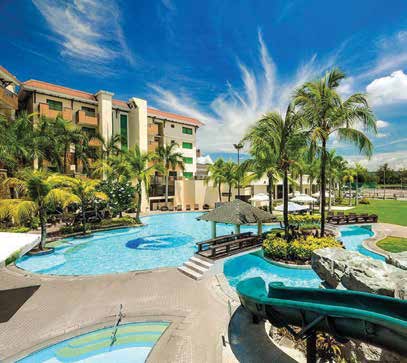
As China continues opening to the global financial system and adapting to world standard business practices, the unique role of junkets for players from the mainland and other Asian markets will diminish, and casinos will become more willing to take on traditional junket functions, including player finance, Mr Macomber, a former CEO of Jimei’s Fontana resort, suggests. “It may take 10 years, 20 years, 50 years and certain pure boutique style junket companies will still exist, but beside the repercussions of the decrease in VIP play, even more fundamentally, junkets as middlemen can’t survive big company corporate ownership, which does not like sharing their profits with others. This inevitability was put in motion the moment Macau gaming was opened to large Western and Asian gaming operators.”
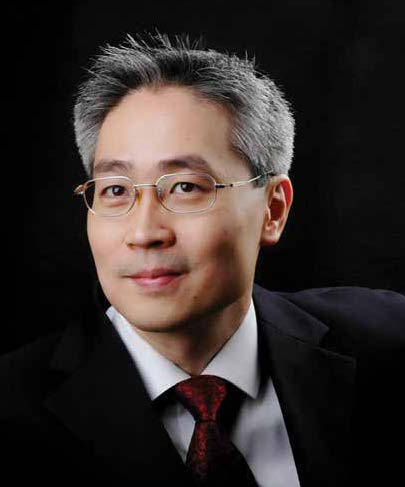
“Junkets don’t want to be the wedding dress,” Pacific Financial Services founder Tony Tong says, citing the Chinese saying that the wedding dress gets used on the day of the wedding then is forgotten. “Sooner or later they lose their customers to casinos.”
Industry insiders say it’s no great leap for junkets that operate VIP rooms in Macau to run their own casinos. There’s a range of opinions about junkets’ capital capabilities as investors and whether casino operation or junket promotion is the more profitable business. Jimei, Hengsheng and Suncity illustrate different approaches to junkets becoming casino owners.
PHILIPPINE DREAM
Jimei pioneered casino ownership by junkets with Fontana, an opportunity that followed the US withdrawal from Clark Air Force Base in 1991. Located about 80 kilometers (50 miles) northwest of Manila, Clark and surrounding areas and totaling 632 square kilometers (244 square miles), Clark once housed 15,000 US military personnel and their families. The vast plot was divided into a Philippine military facility, commercial Clark International Airport and Clark Freeport, a special economic zone with duty free imports and 5% corporate tax for qualifying investors, leveraging the airport as a magnet for cargo and passenger traffic.
In 1998, Fontana’s original investors acquired a 300 hectare plot including the US base’s officer housing area, laid out like an American suburb with extensive green areas, a stark contrast to urbanized Manila or Macau, and just a 10 minute drive from the airport. Conceived as a membership resort and secured with gated, guarded entrances, Fontana refurbished former military duplex homes and built new villas, nearly 500 units in all, offered on an ownership or timeshare basis. Pagcor, the Philippine casino regulator and operator, granted Fontana a gaming license “to cater to foreign junket players and certified club members” in 1999. As a leading Macau junket promoter, Jimei was already doing business with Philippine casinos. Fontana chose Jimei to operate the casino, with Pagcor’s consent, in 2004, the year the resort opened. Jimei eventually took control of the leisure park operation as well.
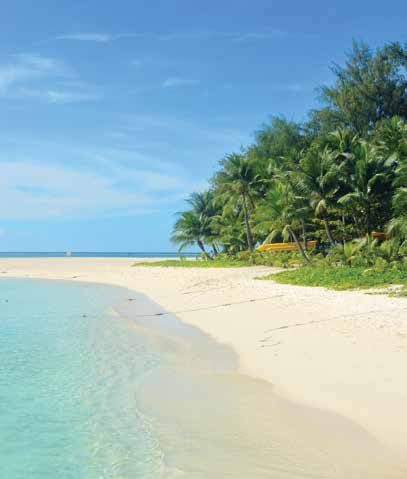
Fontana has grown into Jimei’s flagship property, open to the public as well as members, with a total investment in excess of US$100 million. There’s a 66 room hotel plus 115 villa and townhouse rental units, with plans to expand to 1,000 villas plus a high rise hotel with 2,000 rooms. The water park has theme areas, slides, a wave pool and lazy river ride. Other activities include sports such as tennis and basketball, a spa, a dozen F&B options, banquet and meeting facilities, plus a nine hole par-three golf course. Fontana’s adjacent golf club has two 18 hole courses designed to appeal to Koreans, the Philippines’ largest visitor group and a significant resident minority. Jimei Chairman Jack Lam is an avid golfer and tournaments are a regular feature. The casino has about 150 tables and a like number of gaming machines. Fontana members can bring up to two guests to the casino but its focus remains on overseas VIPs. Macau junkets besides Jimei regularly provide players. Gaming taxes are low, so commissions are well above Macau’s 1.25% cap. Under its license, Fontana pays a 10% fee to Pagcor on mass gross gaming revenue and 10% on net VIP win after commissions. Jimei also continues operating as a junket promoter at other Philippine properties, including Solaire Resort and Casino in Manila and Fort Ilocandia Resort Hotel on the beach in northern Luzon.
“Fontana’s success owes more to Dr Lam, his vision as well as his reputation and loyal following developed in Macau than to the Philippines, favorable tax rates and commission rebates and the leisure facilities themselves,” Dean Macomber says.
Jimei’s ownership of its eponymous Macau casino came about in 2009 when Mandarin Oriental International sold its 50% stake in what’s now the Grand Lapa Hotel, next to Sands Macao, to its partners, Stanley Ho’s STDM and Shun Tak Holdings. They chose Jimei to operate the gaming area, previously Oriental Casino, under SJM’s license as a satellite facility. Jimei renovated the casino, which Cover Story has about a dozen tables and 60 slots machines, to feel like an elegant sitting room, fitting the hotel’s grande dame ambiance. There’s casino access from the hotel and the street. With both Fontana and Jimei Casino, the junket promoter became an owner in established gaming destinations where it had extensive experience.
DISTANT BEACHHEAD
For its foray into casino ownership, Hengsheng Group focused on a new gaming jurisdiction. Investors affiliated with Hengsheng acquired Hong Kong listed First Natural Foods for HK$400 million (US$52 million) in November 2013 and renamed it Imperial Pacific International. Around the same time, associates of the junket group began efforts to get casino gaming legalized in Saipan, the largest island in the Commonwealth of Northern Marianas Islands. CNMI is a self-governing US territory of 57,000 in the Pacific, about five hours by air charter from Shanghai, expected to welcome 500,000 visitors this year to its idyllic beaches, with mainland China, Korea and Japan the largest source markets.
Smaller CNMI islands Tinian and Rota had previously legalized gaming with limited success: Tinian’s long struggling casino got raided by US Treasury officials last year, resulting in record fines for money laundering violations; and Rota’s casino closed within weeks of opening in 2011. Saipan voters twice rejected casinos in referendums. Nevertheless, CNMI’s legislature legalized Saipan casinos in March 2014. Imperial Pacific subsidiary Best Sunshine International, then led by former Genting Singapore General Counsel Terence Tay, moved to secure the license, which requires development of an integrated resort with a minimum $2 billion investment and 2,000 guest rooms. Even with an annual license fee of $15 million in lieu of gaming taxes, the lofty investment requirement appeared designed to dampen interest. Mega Stars, the Hong Kong-based owner of Tinian’s casino also applied, leading to a spirited competition. Best Sunshine promised a $3 billion resort and a $30 million community development fund, including $10 million in direct payments to Saipan citizens, and won the license.
Even though it had the only hand left in the game, Best Sunshine raised the ante again in September last year, issuing a $7.1 billion, five phase development plan encompassing 4,252 hotel rooms, 300 villas, 1,600 gaming tables and 3,500 slot machines at two sites, a town hotel and a beach resort. To replace Mr Tay, who left shortly after the license was granted, Imperial Pacific hired Mark Brown, former president of Sands China and most recently chief operating officer for NagaWorld in Cambodia, who was tasked with scaling up junket operations. As Best Sunshine’s president and CEO, Mr Brown secured a 59,000 square meter site for the town hotel that will have 50 rooms, 300 tables and 500 machines in its initial phase. Construction began in July, due for completion late next year.
To prepare gaming floor personnel, CNMI allowed Best Sunshine to open a training casino in July, 16 months ahead of the projected hotel opening date, in a shopping mall that caters to tourists. Dubbed Best Sunshine Live, the temporary casino with capacity for about 40 tables and 100-plus machines, added VIP operations early last month, held its grand opening on November 27 and expects to “commence collaboration with junket operators” this month, according to Imperial Pacific’s filing with the Hong Kong stock exchange. (In October, Imperial Pacific dropped its profit share agreement with Hengsheng, tied to a HK$400 million convertible loan, but company ownership remains linked to the junket.)
Imperial Pacific continues to search for a site for its larger resort project. CNMI’s Department of Public Lands last month issued a Request For Proposals on a 1.61 million square meter (398 acre) site currently occupied by Mariana Resort and Spa, whose lease expires April 30, 2018. Mr Brown says Best Sunshine “will be as heavily involved as we possibly can be” in pursuit of the site. “We are here on the island and we have proven the type of business and type of neighbor that we are, so we are not going to sit back and watch someone else go in for the RFP,” Mr Brown told local media.
Mariana Resort’s owner Kan Pacific, Saipan’s largest remaining Japanese hotelier, dating to CNMI’s 1980s heyday as a getaway for Japan’s middle class, has mounted a legal and grassroots campaign to extend its lease. Kan Pacific lawyers charge the RFP violates lease terms. Hundreds attended a public rally in support of lease extension. “We expect robust competition for a parcel of this magnitude,” Public Lands Secretary Pete Tenorio wrote in a letter to the Saipan Tribune newspaper. “If Kan Pacific makes the best proposal, we welcome them to continue to operate Mariana Resort. If not, we welcome the bidder who proposes the highest and best use for the entire premises that will generate the most income for the collective owners of public lands.”
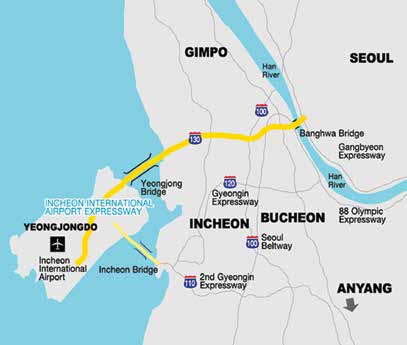
In South Korea, Imperial Pacific participated in the first round of competition for two new licenses for foreigner-only casinos. It was one of four groups proposing an integrated resort near the previously approved Caesars Entertainment/Lippo IR site in Midan City on Incheon’s Yeongjong Island. Imperial Pacific didn’t indicate whether it joined the final proposal phase that was scheduled to close late last month. However, Seoul based KORE Policy and Management Consulting General Manager Tim Lee says that, days ahead of the deadline, Imperial Pacific was one of just two groups that made the $50 million deposit required to submit a proposal. Independent activist investor and US corporate director Michael Levin, who has worked in Korea, thinks it’s possible Imperial Pacific’s October decision to drop its profit share agreement with Hengsheng, tied to a HK$400 million convertible loan, divorcing it from the junket’s operations, could be helpful to win licensing approval from Korean regulators, even though Imperial Pacific’s ownership remains linked to Hengsheng.
FIRST STEP
Suncity’s first move into casino ownership was announced in March, as a partner with Chow Tai Fook Enterprises and VinaCapital in central Vietnam’s Quang Nam province. Genting Group and VinaCapital originally planned to develop an IR on the site, known as Hoi An South, but Genting, a 20% partner, pulled out in 2011. Chow Tai Fook, which owns 10% of STDM and is part of the Destination Cover Story “In South Korea, Imperial Pacific participated in the first round of competition for two new licenses for foreigner-only casinos. It was one of four groups proposing an integrated resort near the previously approved Caesars Entertainment/Lippo IR site in Midan City on Incheon’s Yeongjong Island.” December 2015 inside asian gaming 13 Brisbane consortium led by Australia’s Echo Entertainment which was awarded the Queen’s Wharf IR development project in July, reportedly has taken a majority stake in the Vietnam project’s revival. Suncity is believed to have a small piece, in exchange for providing customers from its database. The proposed IR site is some two hours by road from the nearest international airport in Danang, which gets four flights a day from Macau. Danang’s Crowne International Club regularly receives Macau junket players and is located on the grounds of a four star beachfront hotel.
Vietnam requires IRs to invest US$4 billion, acceptable in phases. Hoi An South’s US$500 million first phase, planned to open in 2017 or 2018, is expected to have a casino with 90 tables, a hotel and golf course. Vietnam permits gaming for foreign passport holders only. However, the government’s long awaited Casino Decree, expected imminently for nearly two years, may include some provision for limited local play.
Looking at the three junket promoters’ initial moves into casino ownership, some common themes emerge. Most notably, junkets favor low tax jurisdictions. Saipan has no gaming tax. Clark offers a discount on the Philippine’s already low rates — 5% for VIP play and 17% for mass market. Vietnam has a nominal tax rate of 30%, rising to 35% on January 1 accompanied by a corporate tax cut from 22% to 20%. But it allows commissions to be deducted from revenue, so Vietnam’s effective tax rate under the new rules will be an estimated 17%. South Korea levies total 14% for foreigner-only casinos. “Lower taxes mean better rebates and commissions,” Tony Tong says, plus more profit into the operator’s pocket.
As owners or promoters, junkets favor jurisdictions with liberal regulatory regimes. “Southeast Asian countries are more open minded about proxy betting, phone betting and online betting, which is unavailable in Macau,” Mr Tong says. With live video streaming from casinos and online gaming licenses available, he estimates offsite play constitutes 30% of VIP revenue in the Philippines.
Pagcor has evolved as a regulator since 2004, when Jimei got its license, to the point where Caesars thinks it can have a Manila casino without risk to its US operations. Jimei has adapted to changing rules there as well as Macau. In Vietnam and Saipan, authorities are still creating regulatory regimes, though Saipan is subject to US federal law.
Like other resort developers, junkets want attractive destinations. Quang Nam and Saipan have pristine beaches and are near historic areas including ancient temples in Vietnam and the atomic bomb launch site in Tinian. Fontana offers an escape from urban drudgery with greenery, golf and nearby mountains.
Some things don’t seem to matter to junkets moving into casino ownership. While the Philippine market supports Fontana’s gaming and non-gaming segments, the newcomers don’t seem interested in local play. Korea and Vietnam are essentially foreigner only markets, while Saipan has just 50,000 people. Again excepting Fontana at Clark, easy commercial air access also doesn’t seem to be a major consideration. Junkets seem confident that they have the players and can get them to their destinations with the right incentives. Increasingly, they’re willing to put their money on it.






